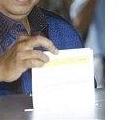Indonesia's President Yudhoyono Wins Parliamentary Polls
After weeks of protests and criticism over their handling of the elections, Indonesia's Electoral Commission fulfilled its commitment to deliver the official count one month after the polls. The Democrat Party of current President Susilo Bambang Yudhoyono, or SBY as he is popularly known, was the clear winner with almost 21 percent of the vote. The result is a significant victory for the young party, almost tripling the number it received in 2004.
Traditional political heavyweight the Golkar Party, which was once the vehicle of former dictator Suharto, came in second with 14.45 percent of the votes, while the Indonesian Democratic Party of Struggle of former president Megawati Sukarnpoputri slipped behind with just over 14 percent.
Parties or coalitions must win 25 percent of the popular vote in order to field a candidate in the Presidential elections scheduled for early July. This means that all the parties will have to form a coalition in order to contest the top-job.
Back-room negotiations between parties have been ongoing, providing daily material for local news media since the polls were concluded. The Golkar party has announced that current Vice President and party chairman Jusef Kalla will be running for the post with former military General Wiranto as his vice-presidential partner.
But the party remains divided over the decision and there is speculation that Golkar could also offer a vice-presidential candidate to run with President Yudohoyono. Stephen Sherlock, a Southeast Asian political expert and consultant to the Australian government, says Golkar's options are limited. "Well they're obviously in a difficult position in that they've first of all done so poorly under Kalla's leadership," he said. "So usually in those circumstance usually political parties start asking questions about whether or not it was the fault of the leader and the leader comes under pressure to be removed from his position possibly. But the problem is they don't have anybody who can replace him." Megawati Sukarnoputri also intends to run again but has yet to announce her vice-presidential mate. Incumbent Yudohoyono may choose to cut ties with the Golkar party, perhaps partnering with the Islamist Prosperous Justice Party or PKS, which won 7.88 percent of the vote. The PKS has already declared its intention to support President Yudohoyono's candidacy. Stephen Sherlock says a presidential partnership with the PKS would not be good for Indonesia's long-term political development. "It would be dangerous for the longer term future of Indonesia for a party like PKS with its Islamist agenda to be brought into the fold in that way," said Sherlock. "He would have, I think, a difficult relationship with a Vice-President from PKS. But in the immediate term well yes there are arguments for it, from his point of view.
According to the Electoral Commission 121 million out of 171 million eligible voters cast a ballot in the polls. However more 17 million votes were declared invalid.
By Katie Hamann Jakarta 10 May 2009

